Florida primaries: The political brawl brewing over Miami’s airwaves
- Published
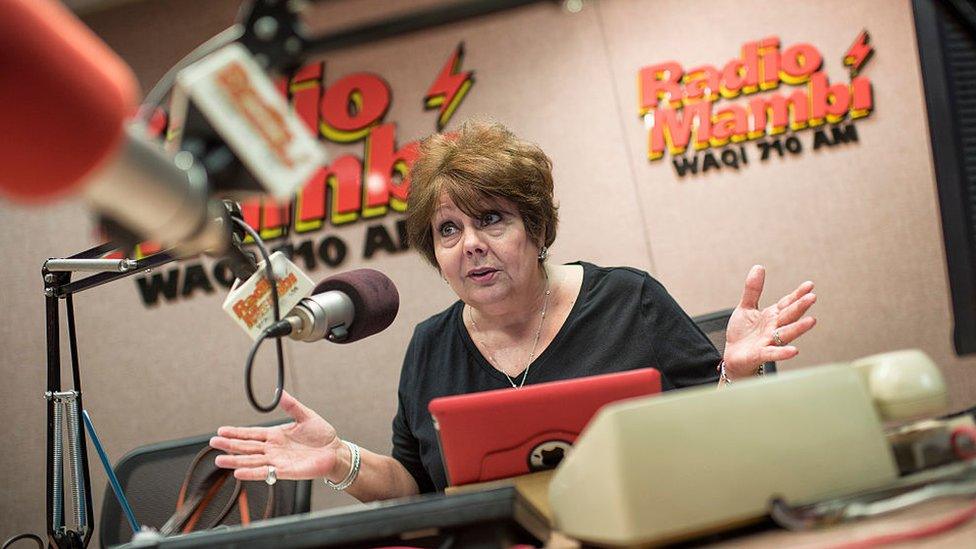
A Radio Mambi host, Ninoska Pérez Castellón, in 2015
As a young girl growing up in South Florida, Cuban-born restaurateur Irina Vilariño, 46, vividly remembers the soundtrack of her family life: the chatter of a much-beloved local radio station, Radio Mambí.
"I get chills thinking about it," recalls Ms Vilariño, who was four when her family escaped Fidel Castro's government. "Radio Mambí gave us a voice. The voice we lost in Cuba. It unified our community."
Founded in 1985 by Cuban exiles, Radio Mambí - named after Cuban guerrillas known as "mambises" who fought for independence from Spain - soon became an influential fixture of Miami's large community of Cuban exiles. The radio gave voice to the exiles' vocal opposition of Cuba's communist regime.
Today it is still for many the sound of Spanish-speaking Florida: a mix of chatter about modern-day Cuba interspersed, on a recent Friday, with calls from listeners opining about the state primary elections on 23 August - and laments about Democratic President Joe Biden's "socialist agenda".
Its influence on the heavily Republican-leaning diaspora is clear: party bigwigs from George W Bush to Mike Pence have frequented its studios. In 2018, one of the station's most popular and outspokenly conservative radio show hosts, Ninoska Pérez Castellón, even scored an exclusive interview with then-President Donald Trump.
But now, a surprise sale of the station to a media start-up with ties to veteran Democrats has sent shockwaves as far away as the halls of power in Washington DC - and, some say, offered a glimpse into an intensifying battle for the attention of Latino audiences, and, by extension, politically vital Latino voters in a key electoral swing state.
Many are wondering, is this the last election in which Radio Mambí - and stations like it - will play a role in Republican politics?
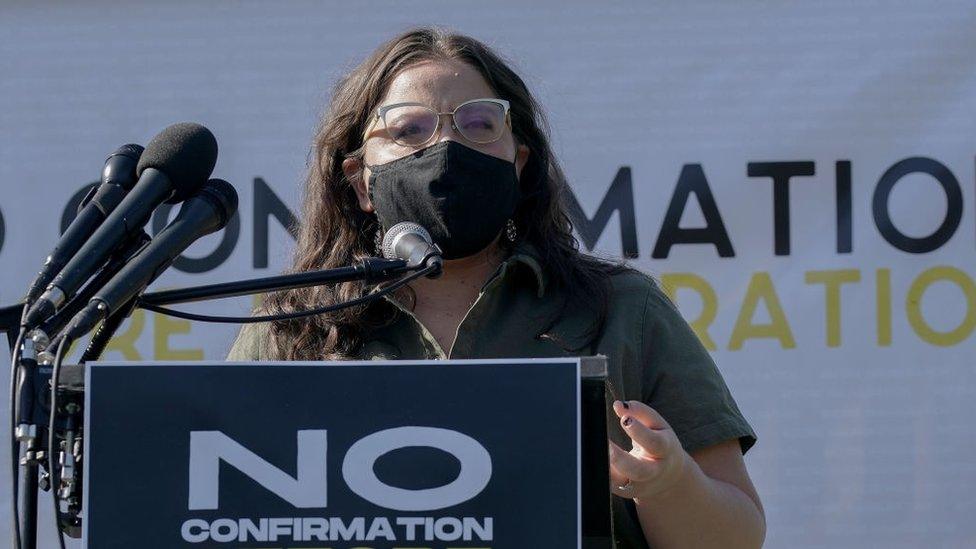
Jess Morales Rocketto co-founded the Latino Media Network
According to the latest census data, there are now 62.1 million Latinos in the US, and Spanish is the most widely spoken non-English language.
This audience is largely served by exclusively Spanish-language media, with research from City University of New York showing that about 78% of Latino-focused media is solely in Spanish, compared with 15% that is bilingual.
Radio dominates. Nielsen, a ratings firm, estimates that the medium reaches 97% of the US Latino population each month. Among Latinos over the age of 50, that percentage rises to 99%. In Miami, where 70% of the population is Latino, about one-third of the population is older than 55.
Since 2002, Radio Mambí has been owned and operated by TelevisaUnivision, the largest Spanish-language media conglomerate in the US.
But in June, a start-up, Latino Media Network, announced a $60m (£50m) deal to buy the station and 17 others across the US owned by Univision.
The two Latinas who founded the new venture have deep ties with Democratic politics.
Stephanie Valencia worked in the White House during the administration of Barack Obama, and Jess Morales Rocketto was a campaign aide for Hillary Clinton.
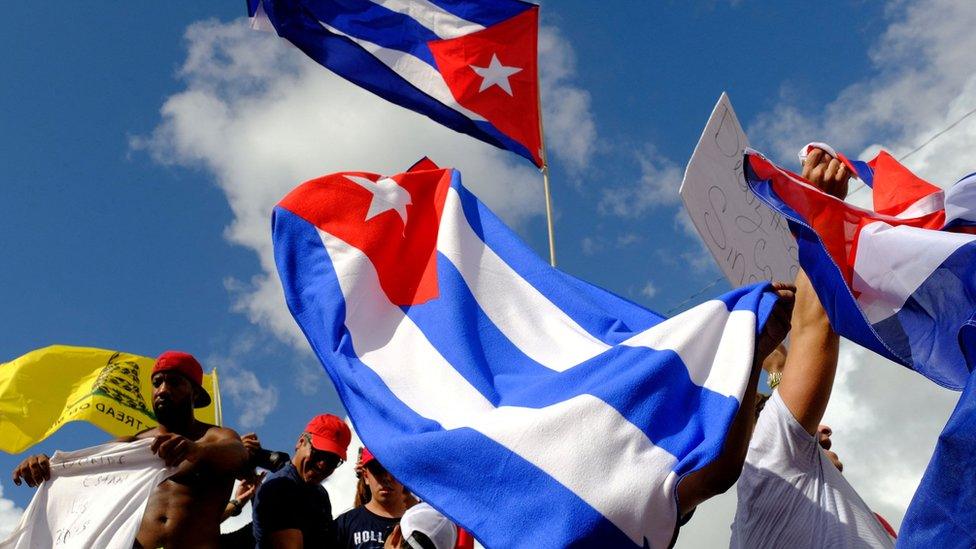
Cuban exiles protesting in Miami in 2021
Given their backgrounds, the sale set alarm bells ringing for both right-leaning Miami Latinos and conservative politicians.
Days after the sale, members of the Assembly of Cuban Resistance - an umbrella group of 35 exile organisations - said it was worried about the "silencing and marginalisation" of stations that had "been the voices of support for Cuba's freedom".
Meanwhile, in Washington a group of lawmakers led by Florida Republican Senator Marco Rubio sent a strongly worded letter to the Federal Communications Commission, urging the government body to "thoroughly scrutinise" the deal, calling it an attempt by "far-left ideologues" to "silence effective conservative voices who challenge their progressive propaganda".
At least three Radio Mambí hosts have left the station after the sale, joining a rival, conservative-backed start-up, Americano Media.
Latino Media Network's two founders did not respond to a request for comment from the BBC and were not made available for an interview, though in statements to the Miami Herald, they vowed not to "change the spirit or character" of Radio Mambí and to welcome all points of view.
Some listeners are sceptical.
"It's a shame," Ms Vilariño told the BBC at one of her restaurants in Doral, a suburb of Miami, where about a dozen mostly Cuban-American patrons sat chatting and sipping dark Cuban coffee on a recent afternoon. "It is a way of silencing our values, our concerns and our information," she said.
A political impact?
The deal is expected to be approved near the end of 2022 and at the earliest, the stations will change hands in the third quarter of 2023.
While that means the ownership switch will come after the 2022 midterm elections, experts believe that competition for Spanish-language media will heat up significantly as the US heads towards the 2024 presidential election.
Political analysts say that the battle to reach Latinos over the airwaves will be of crucial importance for Democrats, who hope to stem slumping support for their party among Latino communities in Florida, South Texas or Arizona.
Eduardo Gamarra, the director of the Latino Public Opinion Forum at Florida International University, said that while the impact of media on politics is difficult to determine, surveys suggest that "people generally believe what is said on the radio".
It could influence voting behaviour, Mr Gamarra said.
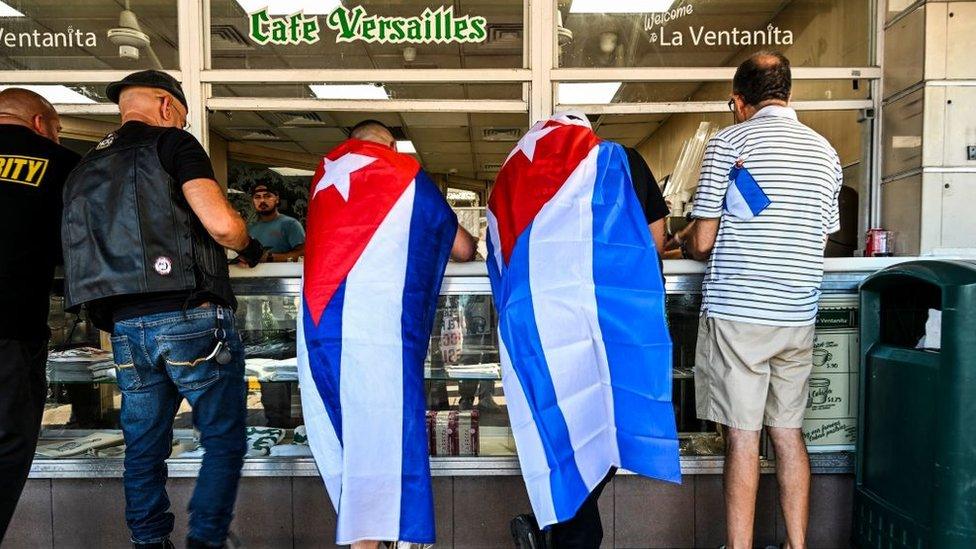
The Versailles restaurant in Little Havana is synonymous with anti-communist politics
The more immediate question, however, is the degree to which Spanish-language media is shaping perceptions of truth among Latinos in the US.
The sale of the station comes at a time when Spanish-language media - including Radio Mambí - has been accused of spreading disinformation, ranging from claims about the 2020 election to the Covid-19 pandemic and vaccines.
"It's constant", said Evelyn Pérez-Verdía, the chief strategy officer of We Are Mas, a firm that aims to fight disinformation in diaspora communities. "It's a large problem."
"There's a pot of gold in using fearmongering by saying that our country is going to become the next Venezuela, in order to persuade them to either stay at home and not vote or vote for the people they want them to vote for," she added.
Former Radio Mambí hosts dismiss accusations of misinformation as little more than attempts to censor opposing viewpoints.
"Liberal media want to censor one's opinion," said Lourdes Ubieta, a lively Venezuelan-born talk show host who resigned from Radio Mambí earlier this year and now works at Americano Media. "Silencing and cancelling - that's the objective."
"If you don't like it, change the channel and don't listen to me," she added.
An uncertain future
Their claims that they will not change the nature of Radio Mambí notwithstanding, the station's expected new owners - and research - are keenly aware of its power for persuasion.
A post-mortem of the 2020 election conducted by Democratic-aligned polling firm Equis - which was also started by Latino Media Network's founder Ms Valencia - found that fears of "socialism" spread by media and online resonated deeply with many Latinos and helped "create space for defection" from the Democrats to the Republican Party.
And statistics suggest that media will have an important role to play in courting Latino voters - who already represent one in eight eligible voters in the US.
Meanwhile, in Miami's Little Havana, Radio Mambí listeners have been left wondering what a change in management will ultimately mean.
"It's always been important for us… it's a point of reference for those of us in exile," said Manuel Gonzalez, a local resident sipping coffee outside Versailles, a famous restaurant synonymous with local anti-communist politics.
"That sale could be bad for Cubans looking for information… I like their editorial line, and that they talk about Cuba's problems… and they're conservative," he said. "We'll see."
- Published12 August 2021

- Published17 February 2021
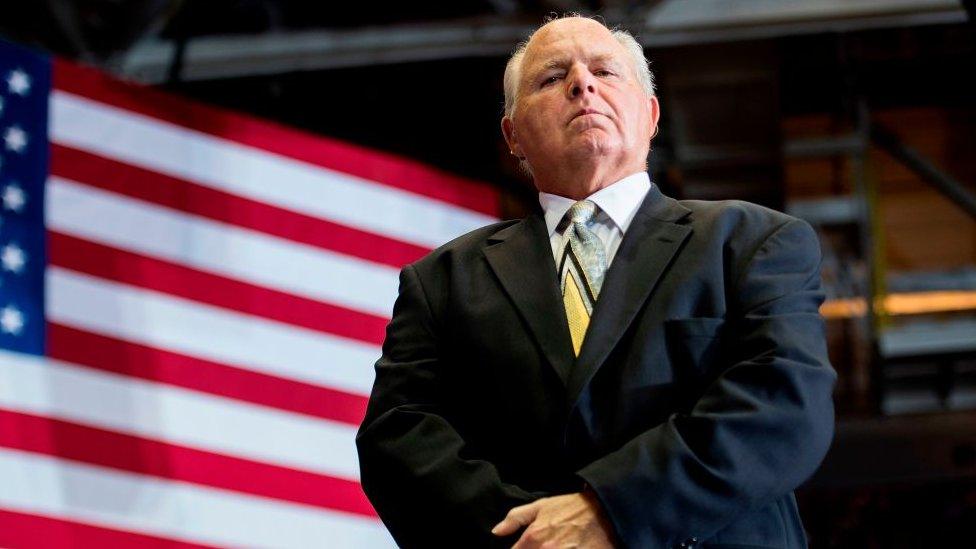
- Published22 November 2020
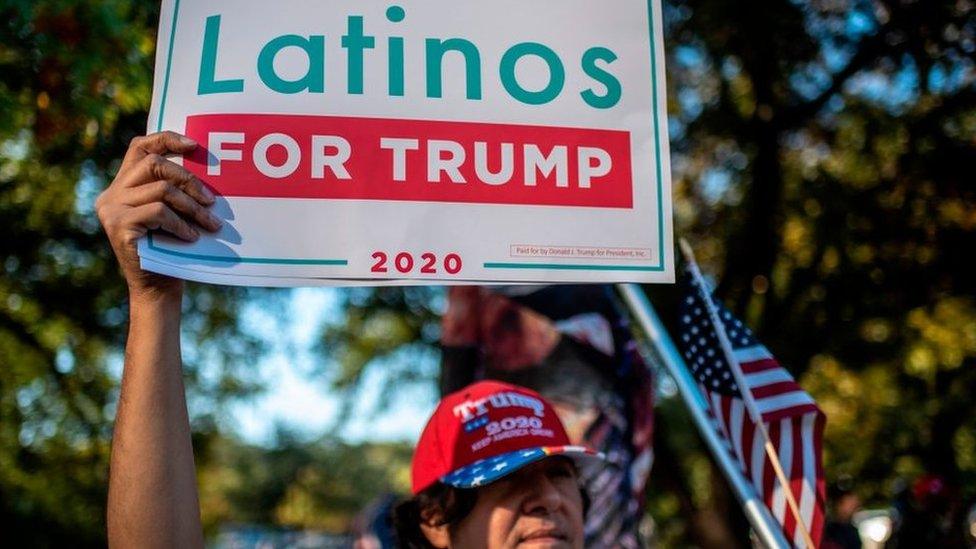
- Published22 October 2018